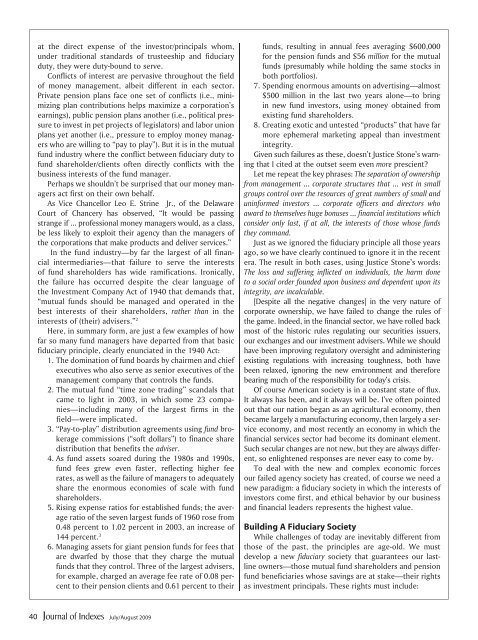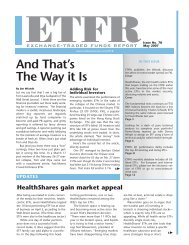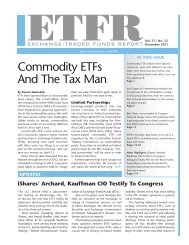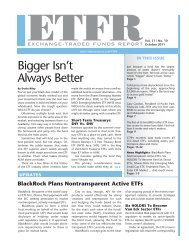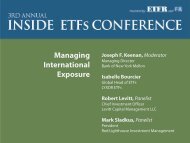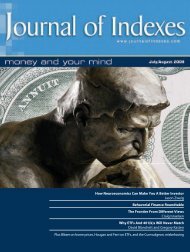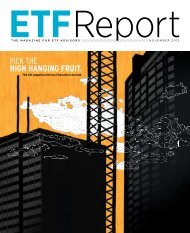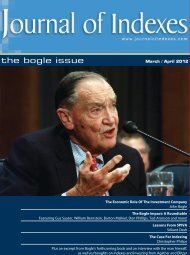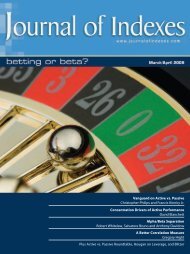How to Kill a Black Swan Remy Briand and David Owyong ...
How to Kill a Black Swan Remy Briand and David Owyong ...
How to Kill a Black Swan Remy Briand and David Owyong ...
Create successful ePaper yourself
Turn your PDF publications into a flip-book with our unique Google optimized e-Paper software.
at the direct expense of the inves<strong>to</strong>r/principals whom,<br />
under traditional st<strong>and</strong>ards of trusteeship <strong>and</strong> fiduciary<br />
duty, they were duty-bound <strong>to</strong> serve.<br />
Conflicts of interest are pervasive throughout the field<br />
of money management, albeit different in each sec<strong>to</strong>r.<br />
Private pension plans face one set of conflicts (i.e., minimizing<br />
plan contributions helps maximize a corporation’s<br />
earnings), public pension plans another (i.e., political pressure<br />
<strong>to</strong> invest in pet projects of legisla<strong>to</strong>rs) <strong>and</strong> labor union<br />
plans yet another (i.e., pressure <strong>to</strong> employ money managers<br />
who are willing <strong>to</strong> “pay <strong>to</strong> play”). But it is in the mutual<br />
fund industry where the conflict between fiduciary duty <strong>to</strong><br />
fund shareholder/clients often directly conflicts with the<br />
business interests of the fund manager.<br />
Perhaps we shouldn’t be surprised that our money managers<br />
act first on their own behalf.<br />
As Vice Chancellor Leo E. Strine Jr., of the Delaware<br />
Court of Chancery has observed, “It would be passing<br />
strange if ... professional money managers would, as a class,<br />
be less likely <strong>to</strong> exploit their agency than the managers of<br />
the corporations that make products <strong>and</strong> deliver services.”<br />
In the fund industry—by far the largest of all financial<br />
intermediaries—that failure <strong>to</strong> serve the interests<br />
of fund shareholders has wide ramifications. Ironically,<br />
the failure has occurred despite the clear language of<br />
the Investment Company Act of 1940 that dem<strong>and</strong>s that,<br />
“mutual funds should be managed <strong>and</strong> operated in the<br />
best interests of their shareholders, rather than in the<br />
interests of (their) advisers.” 2<br />
Here, in summary form, are just a few examples of how<br />
far so many fund managers have departed from that basic<br />
fiduciary principle, clearly enunciated in the 1940 Act:<br />
1. The domination of fund boards by chairmen <strong>and</strong> chief<br />
executives who also serve as senior executives of the<br />
management company that controls the funds.<br />
2. The mutual fund “time zone trading” sc<strong>and</strong>als that<br />
came <strong>to</strong> light in 2003, in which some 23 companies—including<br />
many of the largest firms in the<br />
field—were implicated.<br />
3. “Pay-<strong>to</strong>-play” distribution agreements using fund brokerage<br />
commissions (“soft dollars”) <strong>to</strong> finance share<br />
distribution that benefits the adviser.<br />
4. As fund assets soared during the 1980s <strong>and</strong> 1990s,<br />
fund fees grew even faster, reflecting higher fee<br />
rates, as well as the failure of managers <strong>to</strong> adequately<br />
share the enormous economies of scale with fund<br />
shareholders.<br />
5. Rising expense ratios for established funds; the average<br />
ratio of the seven largest funds of 1960 rose from<br />
0.48 percent <strong>to</strong> 1.02 percent in 2003, an increase of<br />
144 percent. 3<br />
6. Managing assets for giant pension funds for fees that<br />
are dwarfed by those that they charge the mutual<br />
funds that they control. Three of the largest advisers,<br />
for example, charged an average fee rate of 0.08 percent<br />
<strong>to</strong> their pension clients <strong>and</strong> 0.61 percent <strong>to</strong> their<br />
funds, resulting in annual fees averaging $600,000<br />
for the pension funds <strong>and</strong> $56 million for the mutual<br />
funds (presumably while holding the same s<strong>to</strong>cks in<br />
both portfolios).<br />
7. Spending enormous amounts on advertising—almost<br />
$500 million in the last two years alone—<strong>to</strong> bring<br />
in new fund inves<strong>to</strong>rs, using money obtained from<br />
existing fund shareholders.<br />
8. Creating exotic <strong>and</strong> untested “products” that have far<br />
more ephemeral marketing appeal than investment<br />
integrity.<br />
Given such failures as these, doesn’t Justice S<strong>to</strong>ne’s warning<br />
that I cited at the outset seem even more prescient?<br />
Let me repeat the key phrases: The separation of ownership<br />
from management ... corporate structures that ... vest in small<br />
groups control over the resources of great numbers of small <strong>and</strong><br />
uninformed inves<strong>to</strong>rs ... corporate officers <strong>and</strong> direc<strong>to</strong>rs who<br />
award <strong>to</strong> themselves huge bonuses ... financial institutions which<br />
consider only last, if at all, the interests of those whose funds<br />
they comm<strong>and</strong>.<br />
Just as we ignored the fiduciary principle all those years<br />
ago, so we have clearly continued <strong>to</strong> ignore it in the recent<br />
era. The result in both cases, using Justice S<strong>to</strong>ne’s words:<br />
The loss <strong>and</strong> suffering inflicted on individuals, the harm done<br />
<strong>to</strong> a social order founded upon business <strong>and</strong> dependent upon its<br />
integrity, are incalculable.<br />
[Despite all the negative changes] in the very nature of<br />
corporate ownership, we have failed <strong>to</strong> change the rules of<br />
the game. Indeed, in the financial sec<strong>to</strong>r, we have rolled back<br />
most of the his<strong>to</strong>ric rules regulating our securities issuers,<br />
our exchanges <strong>and</strong> our investment advisers. While we should<br />
have been improving regula<strong>to</strong>ry oversight <strong>and</strong> administering<br />
existing regulations with increasing <strong>to</strong>ughness, both have<br />
been relaxed, ignoring the new environment <strong>and</strong> therefore<br />
bearing much of the responsibility for <strong>to</strong>day’s crisis.<br />
Of course American society is in a constant state of flux.<br />
It always has been, <strong>and</strong> it always will be. I’ve often pointed<br />
out that our nation began as an agricultural economy, then<br />
became largely a manufacturing economy, then largely a service<br />
economy, <strong>and</strong> most recently an economy in which the<br />
financial services sec<strong>to</strong>r had become its dominant element.<br />
Such secular changes are not new, but they are always different,<br />
so enlightened responses are never easy <strong>to</strong> come by.<br />
To deal with the new <strong>and</strong> complex economic forces<br />
our failed agency society has created, of course we need a<br />
new paradigm: a fiduciary society in which the interests of<br />
inves<strong>to</strong>rs come first, <strong>and</strong> ethical behavior by our business<br />
<strong>and</strong> financial leaders represents the highest value.<br />
Building A Fiduciary Society<br />
While challenges of <strong>to</strong>day are inevitably different from<br />
those of the past, the principles are age-old. We must<br />
develop a new fiduciary society that guarantees our lastline<br />
owners—those mutual fund shareholders <strong>and</strong> pension<br />
fund beneficiaries whose savings are at stake—their rights<br />
as investment principals. These rights must include:<br />
40<br />
July/August 2009


